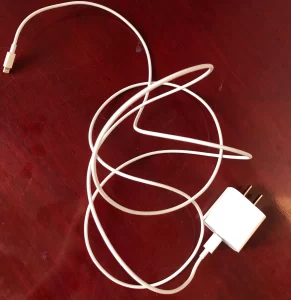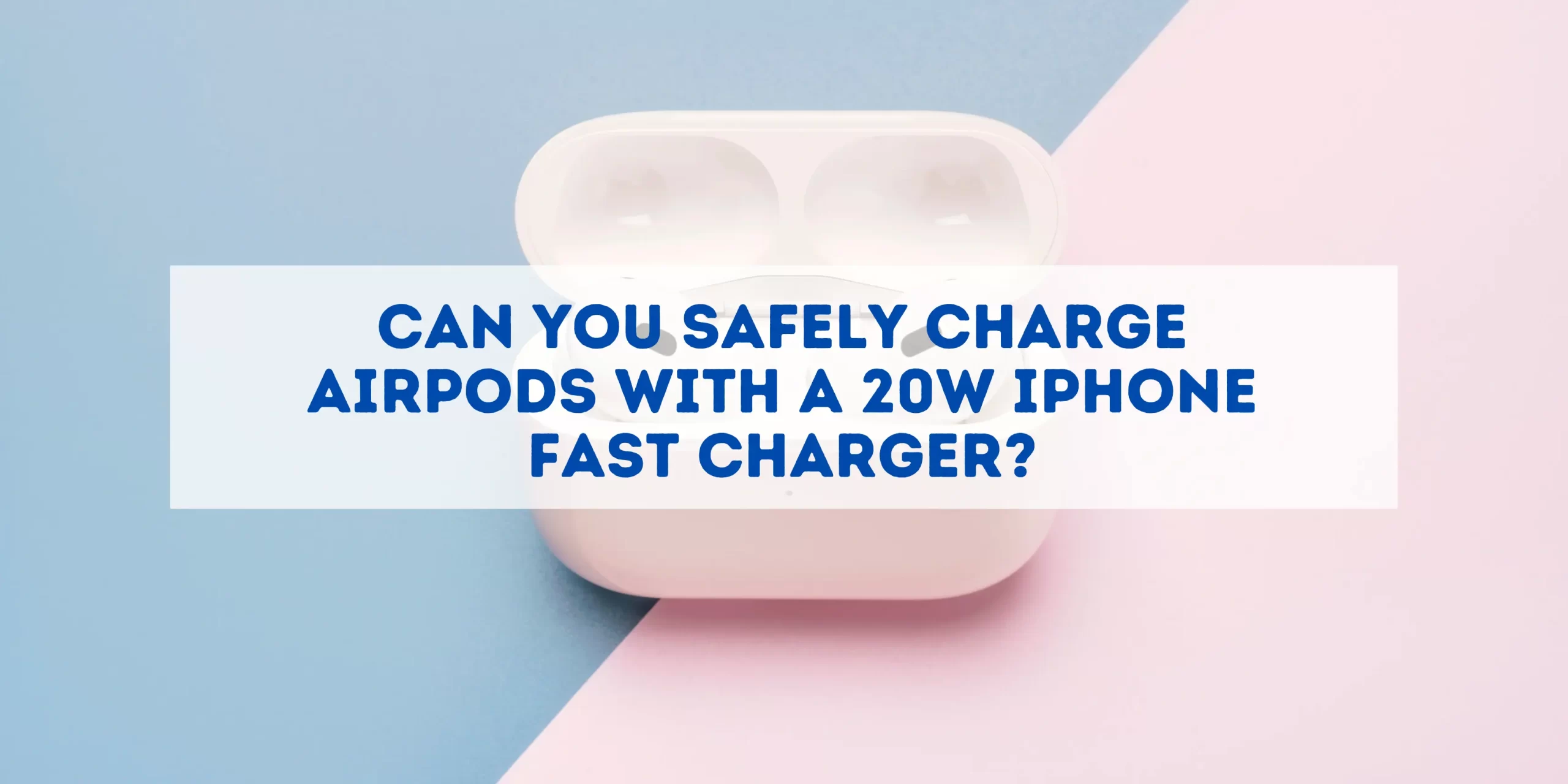In an era where wireless technology and rapid charging have become ubiquitous, Apple’s AirPods and the iPhone 20W fast charger stand out as icons of modern convenience. AirPods, known for their wireless ease and sound quality, have become a staple in the realm of personal audio. Concurrently, the iPhone’s 20W fast charger has revolutionized how quickly we can power our devices, embodying the need for speed in our daily lives. This widespread adoption brings us to a crucial question: Can we safely charge AirPods using a 20W iPhone fast charger? While the answer leans towards caution, suggesting that it’s preferable to stick with the charger designed for AirPods, there’s more to this scenario. To understand the complexities and implications of this question, let’s delve deeper into the technicalities, expert opinions, and the future of charging technology, all of which will shed light on this modern-day conundrum.
Table of Contents
ToggleAirPods Charging Requirements

AirPods, Apple’s revolutionary wireless earbuds, have specific charging needs that are essential for their optimal performance and longevity. The standard charging specifications for AirPods involve a 5W charger, which is the one typically included with the earbuds. This charger provides a steady and safe power input, ensuring that the AirPods’ battery is not overwhelmed during the charging process.
Understanding AirPods’ Charging Specifications
The charging case of AirPods, designed to be compact and efficient, houses a lithium-ion battery that requires careful handling. The optimal charging current for AirPods is much lower than what is required for larger devices like iPhones. This difference is crucial in understanding why a charger’s wattage matters. AirPods are engineered to charge at a lower wattage, aligning with the 5W charger’s output.
Comparing AirPods and iPhone Charging Technologies
When comparing the charging technology of AirPods with that of iPhones, significant differences become apparent. Modern iPhones, especially those that support fast charging, are designed to handle higher wattages, such as the 20W provided by the iPhone fast charger. This capability allows iPhones to recharge quickly without damaging the battery. In contrast, AirPods are not designed for fast charging and thus do not require the high wattage that iPhones can handle.
The disparity in the charging technology between AirPods and iPhones is a critical factor to consider. While iPhones can safely accommodate and benefit from the increased wattage of a 20W charger, AirPods are tailored for a gentler, lower wattage charge. This fundamental difference underpins the need to understand whether using a 20W iPhone charger could potentially pose risks to the AirPods’ battery health and overall functionality.
Features of the 20W iPhone Fast Charger

The 20W iPhone fast charger represents a significant advancement in Apple’s charging technology, designed to drastically reduce charging time for compatible devices. Understanding its technical parameters and working principles is key to assessing its suitability for devices like AirPods.
Technical Specifications and Working Principle
The 20W iPhone charger operates on a higher voltage and current level compared to the standard 5W charger. This increased power capacity enables it to charge devices at a much faster rate. It utilizes USB-C Power Delivery (PD), a fast charging technology that allows for higher power delivery over a USB connection. This technology dynamically adjusts the power output to safely match the device’s requirements.
Comparing with Traditional Chargers
In contrast to traditional chargers, which typically deliver a constant low power output, the 20W fast charger is more versatile and adaptable. It can intelligently modulate power output based on the connected device’s needs, a feature absent in conventional chargers. This adaptability is particularly beneficial for newer iPhone models, which can take advantage of faster charging without risking battery health.
The distinction between the 20W fast charger and traditional chargers lies in their power output and charging speed. While the traditional 5W charger provides a slow and steady charge, ideal for smaller devices like AirPods, the 20W charger is tailored for devices that can handle rapid power intake. This difference highlights the importance of understanding the compatibility and potential impact of using a high-wattage charger on devices not designed for fast charging.
Charging Safety Analysis
When it comes to charging devices like AirPods, safety is a paramount concern. This section delves into how different wattage chargers affect the charging efficiency and safety of AirPods, focusing on the potential risks associated with using chargers that exceed the recommended specifications.
Impact of Charger Wattage on AirPods
Using a charger with a higher wattage than what AirPods are designed for can lead to concerns about charging efficiency and safety. AirPods are engineered to charge optimally with a 5W charger, and using a 20W charger could potentially alter this delicate balance. While the AirPods’ internal circuitry is designed to regulate the incoming power, there’s a risk that the higher wattage could strain the system.
Analyzing Overcharging and Overheating Risks
One of the primary concerns with using a high-wattage charger is the risk of overcharging and overheating. Overcharging can occur when a battery receives more power than it can handle, potentially leading to battery swelling, leakage, or even explosions in extreme cases. Similarly, overheating is a critical risk factor, especially with lithium-ion batteries. Using a charger that supplies power at a rate higher than what the battery is designed to accept can generate excessive heat, thereby increasing the risk of thermal events.
While Apple’s devices generally have safety mechanisms to prevent such occurrences, pushing these mechanisms beyond their intended limits by using a mismatched charger can pose unnecessary risks. It is essential to understand these risks to make informed decisions about charging practices for devices like AirPods. This understanding is crucial not only for preserving the longevity of the AirPods but also for ensuring user safety.
Experiments and Case Studies
To understand the practical implications of using a 20W iPhone charger on AirPods, it is insightful to look at real-life cases and experiments. These instances provide tangible data on the efficiency and safety of such a charging method.
Real-Life Charging Scenarios
Several users have reported their experiences with using a 20W charger for their AirPods. In most cases, the AirPods seem to charge without immediate issues, indicating a level of compatibility. However, these anecdotal experiences vary and do not conclusively establish the long-term effects on AirPods’ battery health.
Analysis of Efficiency and Safety
From the collected data, it’s observed that while AirPods do charge with a 20W charger, the charging time does not significantly decrease compared to using the standard 5W charger. This is likely due to the AirPods’ internal circuitry, which regulates the power intake to safe levels. The key concern, however, lies in the potential long-term impact on battery health and the increased risk of overheating.
Although immediate damages or malfunctions might not be evident, the prolonged use of a high-wattage charger could strain the battery. The heat generated during such charging sessions, although within safety limits, could cumulatively affect the battery’s longevity and performance. It is essential to consider these factors for those who frequently use a 20W charger for their AirPods, as they may inadvertently be compromising the lifespan of their device.
Expert Opinions and Recommendations
In the realm of electronic devices, the advice of experts and official recommendations play a critical role in guiding safe and efficient usage. This section focuses on what specialists in the field and official guidelines suggest regarding the use of a 20W iPhone fast charger for AirPods.
Insights from Electronic Product Experts
Electronics experts often emphasize the importance of adhering to manufacturer’s specifications for charging devices. They caution against using chargers with significantly higher wattages than what the device is designed for, as it may lead to potential long-term battery issues. While modern devices have safety circuits to prevent damage from higher wattage chargers, experts advise that it’s best to stay within recommended limits to ensure battery longevity and safety.
Official Guidelines and Safe Charging Practices
Apple’s official guidelines suggest using the charger that comes with the device or a charger that matches its specifications. For AirPods, this would be a charger with a power output similar to the included 5W charger. Following these guidelines helps in maintaining the health of the device’s battery.
In addition to using the appropriate charger, experts recommend other best practices for safe charging:
- Avoid charging devices overnight or for prolonged periods.
- Keep the charging device in a cool, ventilated space to prevent overheating.
- Regularly inspect the charger and cables for any signs of wear or damage.
Adhering to these practices and expert advice not only ensures the safe charging of your devices but also contributes to their optimal performance and longevity. It’s crucial for users to be informed and cautious about their charging habits, especially when dealing with high-powered chargers and delicate devices like AirPods.
You may also like: Does Apple Offer Complimentary Charger Replacements?
Future Outlook
The future of charging technology is an exciting frontier, with innovations that promise to transform how we power our devices. This forward-looking perspective considers the trends in charging technology and how they might influence products like AirPods.
Trends in Charging Technology
The evolution of charging technology is leaning towards faster, more efficient, and safer methods. We are witnessing a shift towards wireless charging and the development of fast-charging technologies that are more adaptable and gentle on batteries. This progression aims to reduce charging times significantly while ensuring battery health is not compromised.
AirPods’ Adaptability to Future Charging Tech
As for AirPods, Apple’s history of embracing technological advancements suggests that AirPods will likely adapt to future charging standards. Future iterations of AirPods might be equipped to handle more advanced charging methods, including improved wireless charging capabilities or even energy harvesting techniques.
The ongoing research and development in battery and charging technology could lead to AirPods that charge more quickly, efficiently, and safely, aligning with the broader trends in consumer electronics. This adaptability will be key to maintaining the relevance and functionality of AirPods in the face of rapidly evolving tech landscapes. For users, this means a seamless and improved experience with their beloved wireless earbuds, as they continue to integrate cutting-edge technologies.
Conclusion
In conclusion, while it is technically possible to charge AirPods with a 20W iPhone fast charger, it is not the ideal choice for the long-term health and safety of the device’s battery. The best practice remains to use the charger that is specifically designed for the device, in this case, the standard 5W charger for AirPods.
Using the appropriate charger is crucial not just for ensuring efficient charging but also for maintaining the overall well-being of the device. Adhering to the recommended charging practices minimizes risks such as overheating and overcharging, thereby extending the lifespan of the device. As technology continues to evolve, staying informed about the right way to charge our devices becomes more important. In the end, respecting the technological boundaries set by manufacturers is key to getting the most out of our electronic devices, including the AirPods.

